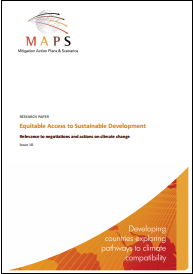Equitable Access to Sustainable Development: Relevance to Negotiations and Actions on Climate Change


Introduction
The effectiveness and stability of any agreement, especially as a basis for cooperation, largely depends on the perception of its fairness by the agreeing parties. It is for this reason that equity has received a lot of attention in the two decades of negotiations under the UNFCCC. This paper reflects on the basis and relevance of equitable access to sustainable development (EASD) in the UNFCCC negotiations and analyses the key arguments presented by the different approaches to achieve fairness in the implementation of the Convention. It concludes by presenting a perspective on an equity reference framework which basis fair efforts on the Ad hoc Group on the Durban Platform for Enhanced Action, the ADP, and considers how such a framework could form part of the 2015 agreement.
Citation
Ngwadla, X. 2013. Equitable Access to Sustainable Development: Relevance to Negotiations and Actions on Climate Change. [Available Online] http://www.mapsprogramme.org/equitable-access-to-sustainable-development-relevance-to-negotiations-and-actions-on-climate-change/. Cape Town: MAPS Programme
(0) Comments
There is no content